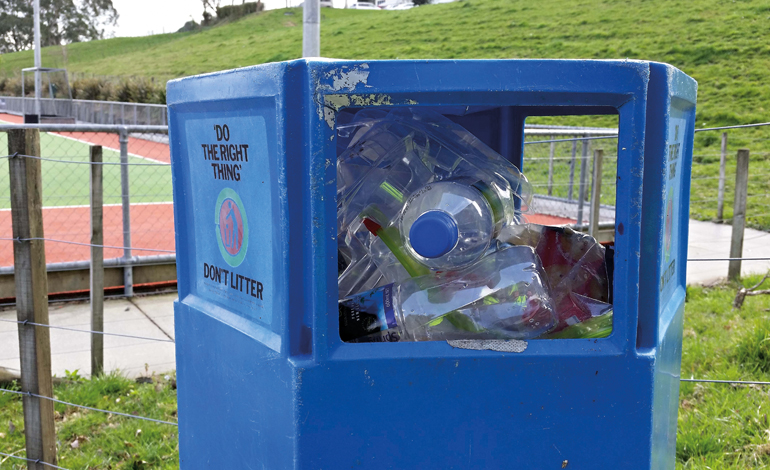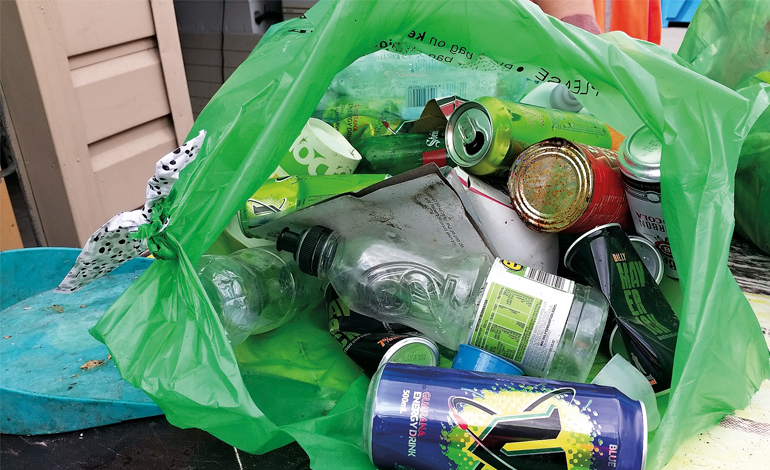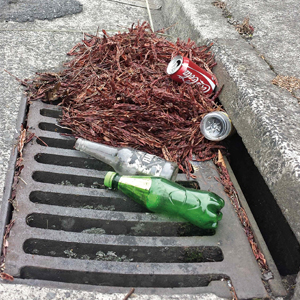Overseas governments are getting tougher with manufacturers and producers of products and packaging. But New Zealand is lagging behind. Marty Hoffart sketched the arguments for change at the recent WasteMINZ Conference. He says there is no reason why a container deposit scheme could not be introduced here.
FIND OUT MORE
In this country, we currently consume 2.23 billion beverage containers each year. A report by environmental consultants Envision NZ says about 60 percent of them go to landfill. That means we dump two Boeing 747 jumbo jets worth in landfills every day. That’s almost a billion containers a year. The report says a 10 cent deposit on beverage containers would create 2400 new jobs, double our recycling rates and add $45 million to the economy annually.
While others introduce mandatory product stewardship schemes to ensure producers take responsibility for everything they make and sell, our country hasn’t done anything much. Banning single use plastic bags earlier this year was a positive step. But we still have no regulation to deal with scrap tyres, electronic waste or beverage containers. As a nation we may be talking about it, but, so far, there’s been no action.
Associate Environment Minister Eugenie Sage has been quoted as saying New Zealanders are rubbish at recycling. She’s also pointed out we are the 10th worst nation in the world for urban waste disposal, right near the bottom of 195 countries.
Last year, a United Nations-commissioned report named and shamed our country for its poor record on recycling electronic waste. The International Telecommunications Union (ITU) singled out New Zealand and Australia, saying “they together produced the highest volumes of e-waste in the world”, while noting they had “among the lowest documented rates for recycling”.
Even if we have the appearance of kerbside recycling bins in front of every home, when it comes to recycling beverage containers, our story is not much better.
What is CDS?
A container deposit system (CDS) adds a refundable deposit to the price of each container, to encourage people to return their empty beverage containers. The containers can then be recycled or refilled. International research shows these systems work best when they include all beverage companies and all container types, from about 300 millilitres to three litres. They should be introduced and regulated by government.
What happens to the containers?
Although there has been talk of a recycling crisis over the past year, we don’t need to send beverage containers to China or any other country. The vast majority of it can be dealt with right here on our shores. Clear plastic PET bottles (that’s the #1 grade) can be recycled in the nation’s capital, so not one plastic bottle has to be exported anywhere.
Wellington-based Flight Plastics has the capacity to recycle every plastic fizzy drink bottle, water bottle, juice bottle – you name it. It will wash them, shred them and reform them into new plastic. These bottles can be recycled over and over again, and a container deposit system would mean millions more would be collected back every week.
What about glass? No problem. None of it needs to go offshore for recycling either. In fact, we’ve been recycling glass for decades, and Auckland’s OI-Glass could crush and melt down every glass bottle used in this country. However, this company faces the same issue as Flight Plastics. OI can only recycle the glass it receives and currently about half of all glass bottles end up in landfills. The same story can be told for aluminium cans as well.
Some people question the need to introduce deposits on beverage containers here. Given everyone appears to have a recycling bin at the kerbside, do we really need this sort of thing in Aotearoa?
According to the experts, we certainly do. And, according to the Kiwi Bottle Drive organisation, there is no time to waste. These people have delivered a compelling campaign backing container deposits and recently gathered more than 15,000 signatures from people seeking the immediate introduction of container deposits on all beverage containers. Although the government says it is interested in further investigation, there is not yet any commitment to such a programme.
It’s not our ability to recycle these containers that’s the problem, it’s getting the public to return them. That is the magic of container deposit systems; it ensures almost all containers come back. When beverage containers are worthless, people don’t really care where they end up. We’d rather drive over them, walk over them or pitch them into the nearest council litter bin.
Placing a value on containers will ensure much higher recycling rates because people return and earn, instead of dumping them or leaving them on the street or footpath.
There is no other effective way to get containers back in great numbers like a CDS. Installing more public recycling bins is certainly helpful but not the answer. Aside from the fact it places the collection burden on councils, this method might increase current rates by one or two percent. We’ll never double our rates to 85 or 90 percent without a deposit refund system.
And what is the cost? Less than a cent per container. That’s all it would take to make the system work here.
Creating a circular economy requires a change in the way we do things now. We need to encourage people to change their behaviour. Behavioural change 101 requires removal of the barrier that impedes people from engaging in a desired activity. If you want people to return beverage containers for recycling, you need to give them an incentive.
And an economic instrument remains a singularly effective behaviour change mechanism: give something a value and people won’t throw it away. If they do, someone else will grab it.
What would it mean for councils?
A recent report, commissioned by Auckland Council and written by economist Preston Davies, backs up the findings of the Envision report and other reports from overseas. The cost-benefit analysis says councils here would save up to $20.9 million a year in kerbside collection costs and an additional $8 million in landfill and litter-related costs.
It suggests that introducing 10 cent deposits on beverage containers would see a net economic benefit of $645 million over the next 10 years. We would stop about 45,000 tonnes of empty glass, plastic bottles and aluminium cans from ending up in our landfills and our environment.
Overseas research says the same thing. Respected environmental consulting firm Eunomia released a report that indicates a (DRS) – Deposit Return System would save local authorities £4.6 million a year in Scotland alone.
Scaled up to the wider United Kingdom economy, the annual net savings to local authorities would be more than £56 million.
The UK study is designed to answer the question: ‘What would be the impacts of the introduction of a deposit refund system for one-way beverage packaging on local authority waste services in England?’
Evidence suggest these bottle return systems run best alongside a kerbside programme, and together they deliver a number
of benefits.
A few years ago, there was a clear line between those supporting container deposits and those opposing. Those supporting have always been NGOs, environmental organisations and local authorities. Those opposing have historically been the beverage industry.
These days, the line is blurred, and some would argue that the line is gone. The beverage industry has become very quiet on the issue, and many from that industry now will tell you they are no longer opposing the idea of a CDS.
Fans of container deposit systems know they provide a financial incentive for consumers to return beverage containers and these systems capture those beverage containers consumed away from home. This transfers the cost of recycling from local authorities to producers and consumers. All deposit schemes increase employment and economic activity and reduce CO2, litter and marine plastic.
We know there is overwhelming support from local authorities. They get it. They’ve read the reports, they know container deposit systems operate alongside kerbside systems all over the world, and evidence shows deposit systems enhance kerbside collections. Although there are fewer beverage containers left at the kerbside, what is in the recycling bin is more valuable, and revenue from kerbside operations goes up, not down.
Local authorities want it, and they want it now. They put a remit to the government after the 2016 LGNZ Annual Conference in Dunedin. There was 90 percent support. What did the government at the time say? Not much.
Who is doing it overseas? Just about everyone except us. There are about 50 countries, states and provinces. In the past two years, four more Australian states have enacted legislation to join long-term CDS users South Australia and Northern Territory.
Why not here?
If all the numbers stack up and economists are saying the benefits outweigh the costs from three to six times, why don’t we have it? Container deposit schemes do not require rates funding or public money to operate. They are self-funding. That must be music to the ears of any elected member trying to increase recycling rates and keep rates and litter down. And we have everything we need in the form of legislation to get started right now.
Frankly, there is no good reason.
Introducing it here requires the government to make the declaration under the Waste Minimisation Act 2008 and go through the regulatory processes. From there, it’s a matter of consulting and setting CDS system parameters, much as they did to ban plastic bags. This would set out roles and responsibilities, and a managing agency would be appointed, and the system would be established. It’s that simple.
In less than a year after being implemented, the Australian ‘Return and Earn’ container deposit scheme in NSW has seen a 69 percent increase in drink containers collected and recycled. In that time, drink container litter volume has fallen by 44 percent. That’s in a year.
We need to stop talking about – and instead start developing – our own circular economy.
• Marty Hoffart is chair of the Zero Waste Network and director of Waste Watchers. 027 230 2256. Marty@wastewatchers.co.nz
This article was first published in the February 2019 issue of NZ Local Government Magazine.




